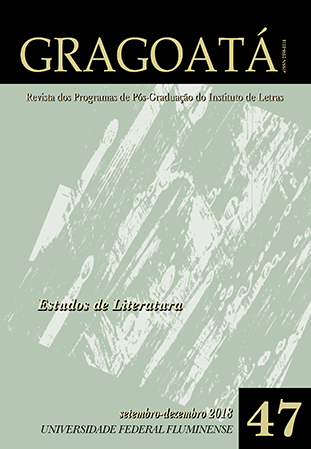“There would this monster make a man”: Colonial power in the 1993 RSC production of 'The Tempest'
DOI:
https://doi.org/10.22409/gragoata.v23i47.33603Palavras-chave:
A Tempestade, Caliban, poder, pós-colonial, performanceResumo
Taking on assumptions about oppression, identity and representation as they are developed in contemporary postcolonial theory, this study proposes the analysis of the 1993 theatrical production of William Shakespeare's The Tempest by The Royal Shakespeare Company (RSC). It aims to discuss the role of Caliban's monstrosity in the production and how it pertains to issues such as power relations and spectacle. The main benefit of doing an analysis of a performance of a Shakespearean text seems to be the possibility of seeing the play's meaning as contingent, as a result of a series of elements (actor's body, visual clues, the theatrical institution, spectatorship) that release it from the burden of being considered as the work of a single, universal, non- contradictory mind that contemporary criticism has pointed out as the 'Shakespeare Myth'. I conclude that the 1993 RSC production presents a Tempest that, in many ways, reinforces traditional positions about the legitimacy of Prospero's dominion over the island.
------------------------------------------------------------------------------------------
“LÁ ESTE MONSTRO FARIA UM HOMEM”: PODER COLONIAL NA PRODUÇÃO DE A TEMPESTADE DE 1993 PELA RSC
Partindo de discussões sobre opressão, identidade e representação desenvolvidas na teoria pós-colonial contemporânea, este estudo propõe a análise da produção teatral de 1993 de A tempestade pela The Royal Shakespeare Company (RSC). Tem como objetivo discutir o papel da monstruosidade de Caliban na produção e como ela se refere a questões como relações de poder e espetáculo. O principal benefício de fazer uma análise da produção teatral de um texto de Shakespeare parece ser a possibilidade de ver o significado da peça como contingente, como resultado de uma série de elementos (corpo do ator, pistas visuais, instituição teatral, espectadores) que a libertam do fardo de ser considerada como o trabalho de uma mente única, universal e não contraditória que a crítica contemporânea apontou como o “Mito de Shakespeare”. Concluo que a produção da RSC em 1993 apresenta uma Tempestade que, em muitos aspectos, reforça posições tradicionais sobre a legitimidade do domínio de Prospero sobre a ilha.
---
Original em inglês.
---
Downloads
Downloads
Publicado
Edição
Seção
Licença
AUTORIZAÇÃO
Autores que publicam em Gragoatá concordam com os seguintes termos:
Os autores mantêm os direitos e cedem à revista o direito à primeira publicação, simultaneamente submetido a uma licença Creative Commons Atribuição 4.0 Internacional (CC BY 4.0), que permite o compartilhamento por terceiros com a devida menção ao autor e à primeira publicação pela Gragoatá.
Os autores podem entrar em acordos contratuais adicionais e separados para a distribuição não exclusiva da versão publicada da obra (por exemplo, postá-la em um repositório institucional ou publicá-la em um livro), com o reconhecimento de sua publicação inicial na Gragoatá.
A Gragoatá utiliza uma Licença Creative Commons - Atribuição CC BY 4.0 Internacional.











